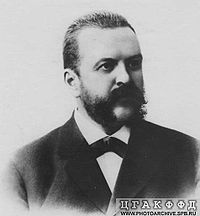
Alexander Bulygin
Encyclopedia

Russian Ministry of Internal Affairs
The Ministerstvo Vnutrennikh Del is the interior ministry of Russia. Its predecessor was founded in 1802 by Alexander I in Imperial Russia...
of Russia
Russia
Russia or , officially known as both Russia and the Russian Federation , is a country in northern Eurasia. It is a federal semi-presidential republic, comprising 83 federal subjects...
from February 1905 until October 1905.
Biography
Graduate of the Imperial School of LawImperial School of Jurisprudence
The Imperial School of Jurisprudence was, along with the Page Corps, the most prestigious school for noble boys in Saint Petersburg, the capital of the Russian Empire....
. Began work in the Tambov district court, 1871; held various administrative offices including that of Governor of Kaluga (1887), of Moscow (1893), and assistant to the Governor-General of Moscow, Grand
Duke Sergei Aleksandrovich
Grand Duke Sergei Alexandrovich of Russia
Grand Duke Sergei Alexandrovich of Russia was a son of Emperor Alexander II of Russia...
(1902).
Bulygin replaced Prince Pyotr Dmitrievich Sviatopolk-Mirskii
Pyotr Dmitrievich Sviatopolk-Mirskii
Prince Pyotr Dmitrievich Sviatopolk-Mirskii was a Russian politician and police official, Minister of the Interior in 1904–1905. He was the son of the general Dmitry Ivanovitch Sviatopolk-Mirskii and father of the literary historian D. S. Mirsky....
on January 20, 1905 after strikes and protests in January. He is most notable for the so-called 'Bulygin Constitution', developed in response to the 1905 Russian Revolution
Russian Revolution of 1905
The 1905 Russian Revolution was a wave of mass political and social unrest that spread through vast areas of the Russian Empire. Some of it was directed against the government, while some was undirected. It included worker strikes, peasant unrest, and military mutinies...
. It was issued in August 1905, and proposed a new consultative body. It did not satisfy those who wanted a fully legislative assembly, and Bulygin's opponents, discontent, advocated the strikes of September and October. After these events, Bulygin was sacked on October 17, 1905 and replaced by the reactionary Petr Nikolayevich Durnovo. After resignation he returned to the State Council.
He was shot and killed by Bolsheviks September 5, 1919.

